Partner content in association with
Japan-Southeast Asia Market Forum Accelerating Innovation-Driven Growth
Emerging stronger into the post-pandemic era, the call for cutting-edge solutions has been answered as numerous startups have stepped forward, and Southeast Asia has proven itself an innovation hotspot. Many Japanese businesses and financial institutions established their footholds in the region since the 1970s, and they’ve shown increasing interest in contributing to this fast-developing ecosystem.
The Japan-Southeast Asia Market Forum on Nov. 15 featured discussions on Japanese-Southeast Asian business ties by bringing together distinguished speakers from Japanese and regional government bodies, top financial institutions, and startups. Topics addressed included sustainable growth and the benefits of business and financial ties between Japan and Southeast Asia.
The event, organized by the Japan Exchange Group (JPX) and the Japan External Trade Organization (JETRO) in association with Nikkei Group Asia, provided a perfect networking opportunity for potential partners to come together, to deepen collaboration opportunities and conceive ideas on global strategies for a brighter future. Dylan Loh, the Singapore Correspondent of Nikkei Asia played emcee and main moderator at this event.
This event also marked the first occasion following the memorandum of understanding signed a week earlier between JPX and JETRO. Henceforth, two parties will work together to contribute to improving corporate value through support for cross-border collaboration between domestic and overseas companies, and to support foreign companies’ investments in Japan and fundraising for business expansion into Japan.
The overarching theme of the event explored how deeper cooperation between ASEAN and Japan could work to improve their respective economies and industries for the future.
The opening remarks were delivered by Yasutoshi Nishimura, the Minister of Economy, Trade and Industry in Japan since August 2022. The keynote address was delivered by Tomoko Amaya, Vice Minister for International Affairs, Financial Services Agency, Japan. Hiromi Yamaji, President and CEO of the Tokyo Stock Exchange, shared a presentation on Restructuring and Invigorating the Japanese Market. Toshiyasu Iiyama, Executive Officer Nomura Holdings and Representative Director and Deputy President of Nomura Securities, shared a presentation with details on revisiting Japan as a financial business hub for the coming years.
The event featured two panel discussions. The first session, “Innovations by Asian Startups; Socio-Economic Transformation Triggers,” focused on the power of technology companies in effecting everyday changes in the lives of people. Members of the first panel discussion included Jonathan Lim, Director, Global Innovation Network, Enterprise Singapore / General Manager, Singapore-Israel Industrial R&D Foundation (SIIRD); Arthur Chua, CEO, Goldbell Group / Co-Founder, SWAT Mobility; Shikha Malhotra, Senior Director of Group Corporate Development, Shiok Meats; and Supriya Singh, Head of South Asia Investments, JAFCO Asia. The discussion was moderated by Nobuhiro Kawase, Managing Director, Head of Asia & Oceania Corporate Banking, Mizuho Bank.
The second panel discussion was “Investors’ Eagle Vision: Spotting Opportunities Amidst Global Fluctuation.” The esteemed panel of speakers, including Yuin Lim, Senior Director, Chief Investment Strategist, Lion Global Investors, and Robert St. Clair, Senior Vice President, Strategist, CIO Office, Fullerton Fund Management, shared their views on how Asia has navigated the period of turmoil in the markets and evolved despite global economic uncertainty and geopolitical tensions between the major powers across the world. The panel discussion was moderated by Tsutomu Hiramatsu, President & CEO, Daiwa Capital Markets Singapore.
Here are the key takeaways from each of the sessions and the speakers.
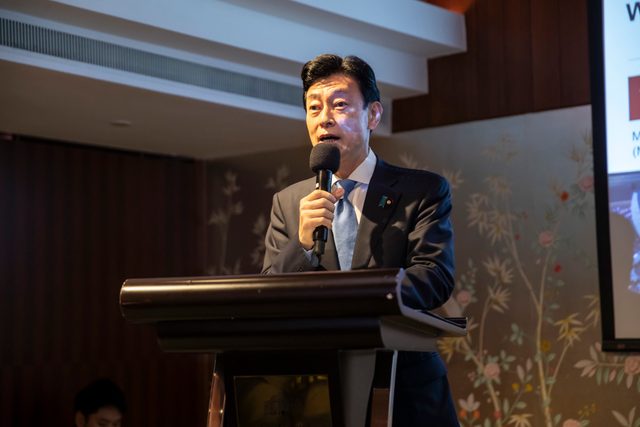
Opening Address
Promoting a Free and Inclusive Economic Order
Yasutoshi Nishimura, Minister of Economy, Trade and Industry in Japan
Speaking about the importance of cooperation in times of crisis, Nishimura said, “For decades, Japan has been building broad supply chains and growing together with partners in the Asia region. We will continue to develop win-win relationships in the Indo-Pacific region, overcome the crisis we are facing now, and open up the future for growth and prosperity.”
Taking a cue from the open Indo Pacific trade advocated by former Prime Minister Shinzo Abe, Nishimura said he intends to promote a free and inclusive economic order. He stressed that Japan would like to build cooperative relationships with like-minded countries/economies in the Indo-Pacific to overcome the current challenges of the pandemic and climate change. Although Japan is often thought to be reluctant to accept foreigners, he said they are committed to accelerating efforts to attract highly skilled foreign professionals.
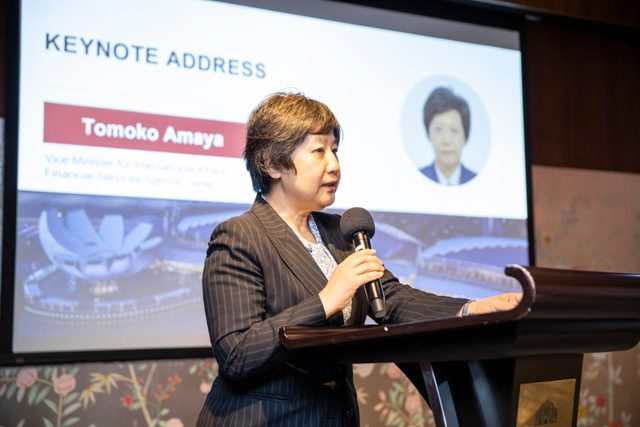
Keynote Address
Deepening Collaboration to Boost Innovation
Tomoko Amaya, Vice Minister for International Affairs Financial Services Agency of Japan
In her keynote speech, Tomoko Amaya highlighted ways to strengthen ties between Japanese companies and Asia from a macroeconomic perspective.
“Going forward, economic ties between Japan and Asia could be strengthened even more. This can be realized by deepening the collaboration to boost innovation, which is the theme of this Forum. Asia has a young population, full of energy and creativity. In particular, Singapore is a hub for bright talent, which led to 10 unicorns being born in that country in 2021 alone. In contrast, the Japanese economy is largely supported by mature firms. To create a second boom in startups, the Japanese government will formulate a Five-year Startup Creation Plan by the end of this year,” she said.
Introducing Japan’s recent effort to enhance its position as an international hub for funds, companies and talent, she said, “Since Japan’s strengths lie in its real economy, with a GDP of 500 trillion yen ($3.6 trillion), and household financial assets of 2 quadrillion yen, we believe in the growth potential of asset management businesses. Backed by strong political leadership, the JFSA established the Financial Market Entry Office as an English contact point in order to assist overseas asset managers entering the Japanese market. Since its establishment last January, the Office has completed 13 license registration cases. The newly entered firms are diverse in nature. Their business types vary from hedge funds to private equity and venture capital to securities brokers. They came from the U.S., Canada, Europe, Singapore and Hong Kong. Some come to Japan as an investment destination, while others come for asset raising purposes. We expect our initiative will further deepen the ties among Japan, Asia and the rest of the world.”
She further added that international cooperation is not limited to the field of traditional finance and that the world needs to collaborate to address climate change and achieve a net-zero society. “Sufficient funding should be allocated to technology development to achieve zero emissions by 2050. This will require a giant step forward from where we are now, and the Japanese government is here to help. Prime Minister Kishida has announced his strong will to work with the public and private sectors to close the financing gap in Asia,” she concluded as she encouraged the attendees to play their role in further deepening the relationship between Japan and Asia.
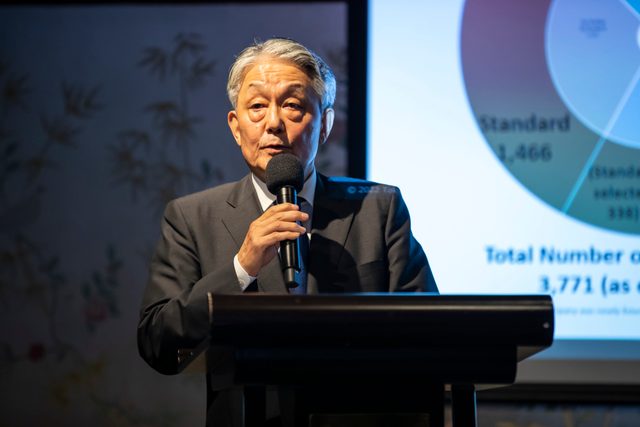
Presentation
Restructuring and Invigorating the Japanese Market
Hiromi Yamaji, President and CEO of Tokyo Stock Exchange (TSE)
Yamaji presented TSE’s efforts to bring about transformation of the Japanese Equity Market. “This past April, TSE’s cash equity market went through a major overhaul. The old four segments, comprising the famous Tosho Ichibu, or First Section, the Second Section, Mothers and JASDAQ, were simplified into the three-segment market – Prime, Standard and Growth. These three markets all have a clear concept, designed to attract and provide various benefits for global and domestic investors,” he said.
He pointed out that market restructuring is aimed at incentivizing companies to take action, and preparing a platform for investors to engage with companies, but it will not be effective unless the companies are organized and structured to formulate a growth plan and execute it. That is the function of Japanese corporate governance reform in encouraging companies to be on a trajectory of long-term growth.
He said it is important that the necessary information be disclosed in order for investors and listed companies to communicate constructively. However, even though Japanese companies are actually working on various initiatives, those are not always well understood due to lack of disclosed information, especially in English for an international audience. One area of particular interest, especially for global investors, is around sustainability and ESG. So the TSE has been promoting English disclosure and TCFD-based disclosure initiatives. The revised Corporate Governance Code clearly states that English disclosure and TCFD-based disclosure are required for Prime listed companies, which is expected to further increase the visibility of Japanese companies to global investors.
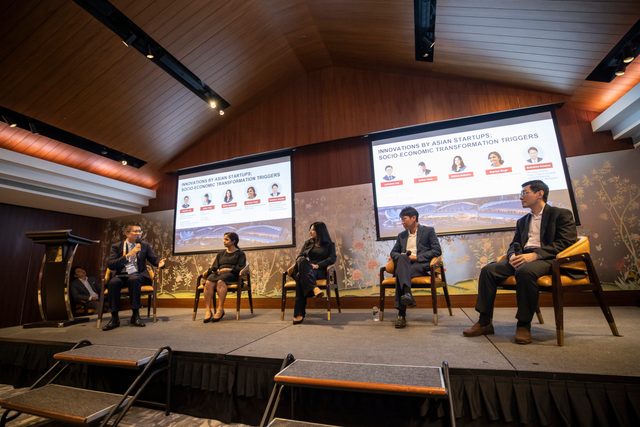
Panel Discussion
Innovation by Asian Start-ups: Socio-Economic Transformation Triggers
Nobuhiro Kawase, Managing Director, Head of Asia & Oceania Corporate Banking, Mizuho Bank
Leading the first panel discussion Mr Kawase set the ground for conversations around the significance of the Japan and Southeast Asia collaboration. He kickstarted the discussion by asking the panelists to share their startup stories and how they channeled their conviction to penetrate the market. The main themes of his moderation, which included innovations by startups and collaboration with Japanese companies, brought to light the role that Japan would increasingly play in this ecosystem.
He concluded the discussion by asking the panelists to share tips with the audience on how ties between Japan and Southeast Asia or Singapore could be further cemented. The particulars of this discussion have been detailed below.
Arthur Chua, CEO of Goldbell Group and Co-Founder of SWAT Mobility
SWAT mobility is an AI SAAS mobility company with the vision to empower the world to move more effectively. Arthur Chua believes that as long as a startup is good for society, it will succeed in a matter of time, as long as it’s well funded. “In terms of conviction, I think the grid comes from the responsibility to shareholders, and how flexible a company is to adapt to changes, how you pivot your business model, how you go for new sales channels, channel partners, go to market strategies, moving to new verticals like logistics – is all very essential. A company needs to be very elastic and has to have good investors to back them up.”
Shikha Malhotra, Senior Director of Group Corporate Development, Shiok Meats
Shiok Meats is a cellular aquaculture and cell-based meat company. Speaking on behalf of the founders, Shikha Malhotra said that the idea initially met with a lot of resistance because of its unusual nature. The founders felt that they could use their stem cell academic knowledge and expertise to innovate and make a product that could impact the way the world eats in the future. Given the deteriorating ocean health and the ever-increasing demand for protein, or seafood, especially in this part of the world, they felt that stem cell-based seafood and meat could be a sustainable, promising option. They wanted to prove to the world that it could be a viable option.
Despite the initial resistance in the market to this idea, the conviction of the founders gradually found them a suite of global investors and they’ve raised about $30 million in the last four years. “Some of our key partnerships include projects with big MNCs, who want to embrace innovation, who want to embrace new technologies. So that’s probably a story that’s as inspiring and as promising for the future as it can be,” she said.
Supriya Singh, Head of South Asia Investments, JAFCO Asia
Speaking of how investors view innovation in the volatile ASEAN market, Supriya Singh said, “Jafco has been investing in Asia for 30-plus years and we have seen many more crises, including the Asian financial crisis, the dotcom bubble and then COVID. But we’ve seen some good companies bouncing back so we will continue to invest. I think that’s the biggest and only hedge any fund can have. We are always invested in founder market companies; we have never been involved in FOMO (fear of missing out) -led investments.”
She believes that good founders have nothing to worry about. “Good companies will always find money behind them and that has been proven over years. So I think when the climate is difficult, we have to sit back, look at all the scenarios that a company has. The good thing is that focus is on cash now. So companies need to generate cash to be able to raise funding. There will be cleansing of the whole ecosystem, which is happening and will continue to happen. But overall, there’s nothing to worry about for good founders,” Singh said.
Johnathan Lim, Director, Global Innovation Network, Enterprise Singapore
Add on to the financing landscape, Johnathan Lim said, “I think this year, we saw more than 500 deals and that in terms of amount is probably over 11 billion Singapore dollars ($8.1 billion). So compared to the same period during 2021, I think it’s slightly maybe about S$2-300 million shy. So the numbers are still coming in strong, meaning that the investors obviously are more cautious. Valuation is coming down, but it’s still healthy. We were quite surprised actually, because at the start of the year, we thought that the landscape would go into some form of autumn, just like what we’ve seen in the U.S., but this has not been the case. I think in Southeast Asia, not just Singapore, this is very healthy. And we hope that next year, we will see the same numbers.
Speaking of what Enterprise Singapore does, he said: “While we are the need in terms of developing the startup ecosystem we do not do that alone. We work with many people. So today if we look at the ecosystem we have 220 trillion celebrators, we have maybe close to 400 VCs in Singapore. There is a strong ecosystem and this did not come by chance. The government has been investing in this startup ecosystem over the past 15-20 years and wants to be committed to stay the course.”
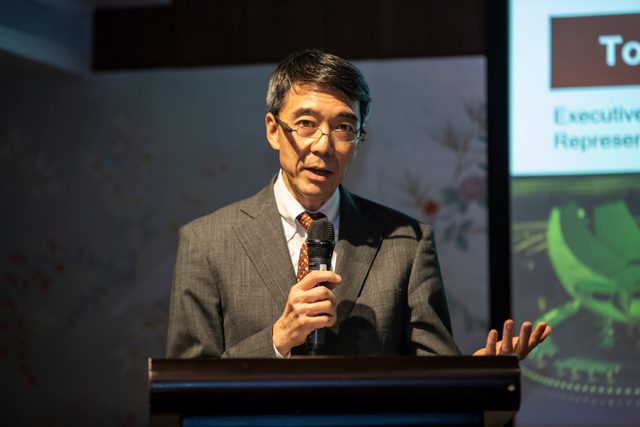
Presentation
Revisiting Japan as Financial Business Hub
Toshiyasu Iiyama, Executive Officer, Nomura Holdings / Representative Director, Deputy President, Nomura Securities
Nomura’s investment management division is enhancing its flagship activities to support corporations to achieve a sustainable performance over the long term and launch Project BRIDGE to bring ASEAN and global investors back to Japan. It is aimed at invigorating the Japanese equity and capital markets.
Speaking of Project BRIDGE, Toshiyasu Iiyama said: “We’ve received positive feedback from retailers in Japan with many investors saying they want to invest in Japan because it gives them both a sense of comfort and stability. The second thing we are doing is supporting fundraising by Asian companies looking to start operations in Japan or expand their businesses. We acted as lead manager when YCT Holdings (Global) Limited, a consulting and investment firm based in Singapore, listed on the TSE market in 2021. We have also worked on fundraising and M&A transactions for some of the Asian leading FinTech companies, such as Zombot and emerging expertise of a lower GreenTech to strengthen our support for Asian companies in the area of ESG. Thirdly, we are beefing up our presence in private market business, including helping unlisted companies raise funds. Asia is a key region for us in those businesses,” he asserted.
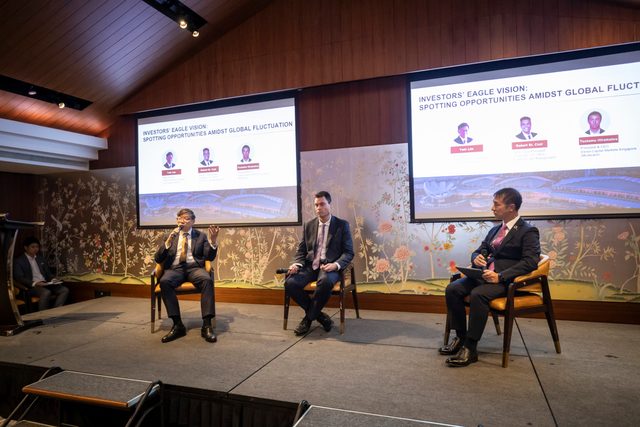
Panel Discussion
Investors’ Eagle Vision: Spotting Opportunities Amidst Global Fluctuation
Tsutomu HIRAMATSU – President & CEO, Daiwa Capital Markets Singapore
In moderating the panel discussion on spotting opportunities amidst global fluctuation, Mr Hiramatsu delved into the global issues that could directly impact businesses. He quizzed panelists on the biggest risk factors they have been faced with in recent years in light of unprecedented events such as rising inflation that central banks needed to get under control to ensure global economic stability.
His questions also sought to uncover if the cooperation with startup innovators from across Asia would help address societal challenges in a volatile environment. In conclusion, he thanked the panelists for their valuable insights which would equip the audience to better maneuver their businesses amidst the global instability.
Robert St. ClairSenior Vice President, Strategist, CIO Office, Fullerton Fund Management
Addressing moderator Tsutomu Hiramatsu’s query about the biggest risk factors in Asia amid global fluctuations, Robert St. Clair said, “The fact is that we’ve been focusing on the growth risk, inflation risk and the geopolitical risks. So when we think about the growth risk, it’s fair to say that markets have fallen quite significantly this year – they have ushered in a lot of bad news. And we think that a lot of the growth risk is probably priced and where we are at the moment is about a half of a global financial crisis. So there is significant bearishness in terms of how markets have corrected. What we think isn’t so well priced is the differentiation that we see across countries, especially when it comes to inflation pressures. When we think about what’s happening in Asia, there’s probably the least inflation pressures here. And that is going to help support competitiveness going forward. The last key risk factor that we’re concerned about is, of course, the geopolitical risks. It is the ultimate unknown and it’s always very difficult to know how well the market is pricing that in. But one thing that has come through this year is that gold has performed relatively well against equities, and of course against fixed income. So the longer that the geopolitical uncertainties are with us, which seems to be the case, the inflation, uncertainties, gold is likely to continue to perform quite well.”
Yuin Lim, Senior Director, Chief Investment Strategist, Lion Global Investors
Speaking of where the largest growth lies in terms of industry sectors Yuin Lim is confident about a number of strategic trends that investors can actually look at. “The areas where the Japanese are actually very strong are robotics and even the semiconductor area. Manufacturing as a whole, that would be a key area where the Japanese can actually shine,” he concluded.
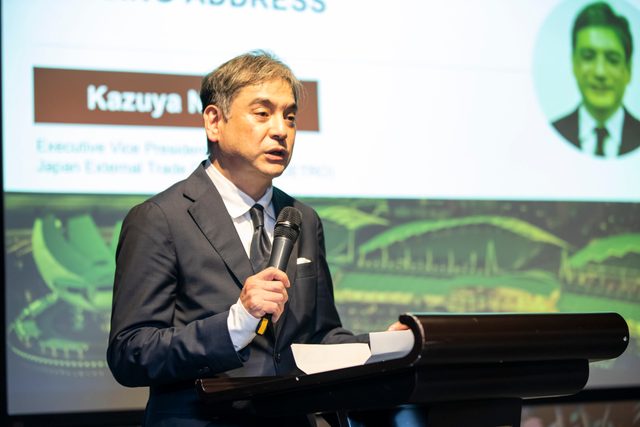
Closing Address
Acceleration of Open Innovation in Japan’s Private Sector
Kazuya Nakajo, Executive Vice President, JETRO
Expressing gratitude in his closing remarks to all the speakers and panelists for their meaningful speeches and insightful discussions, Kazuya Nakajo said: “All these challenges we are facing since the COVID-19 pandemic have changed the landscape in the last three years. Our values and behaviors have been changing and now innovation and new business have been emerging to solve these challenges. The Japanese government is actively engaged in this agenda. In addition, the acceleration of open innovation in Japan’s private sector and in the enrichment of ESG investment was also observed in the past few years. This creates a new market and also new players. This environment is the right time for you to join hands with Japan as a partner in the global marketplace.”

